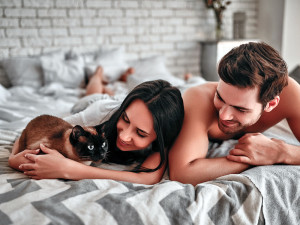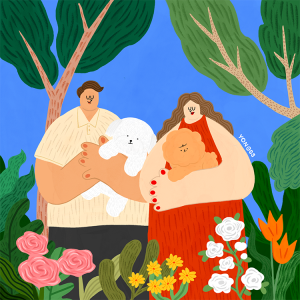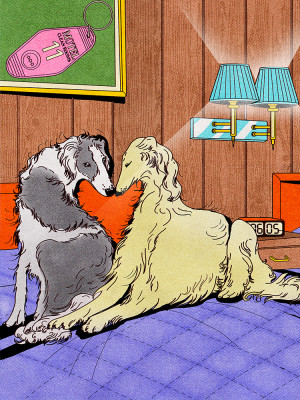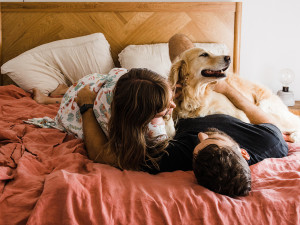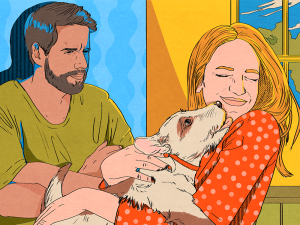Pets Could Be the Secret to a Happier Relationship, New Study Says
Yet another reason to convince your partner to adopt that dog.
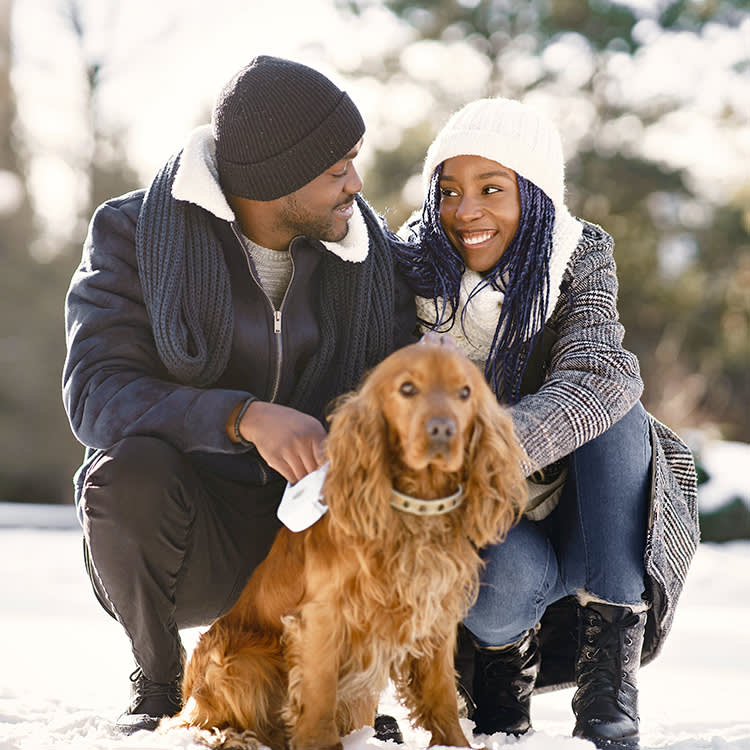
Share Article
One of my favorite activities is sitting on the couch with my partner, yapping about our days and snuggling with our cat. We’re basically doing nothing, but it always makes me feel blissful. A new studyopens in new tab published in the Journal of Social and Personal Relationships found that I’m not the only one: having a pet around during social interactions — especially with a romantic partner — makes people happier.
The mere presence of a pet increases visible signs of positive emotion, like smiling and laughing, during social interactions. It’s apparently true for both platonic and romantic hangs — but when it comes to romantic partners, the effects linger even after the pet goes into another room.
“There has been a lot of research on the links between pet ownership and mental and physical health, and I believe it is now time to investigate the nuances of pet ownership in more detail and how it can impact different areas of humans��’ lives, which could also explain the mechanisms underlying its positive links to well-being,” Ece Beren Barklam, the study’s lead author, told Psy Postopens in new tab.
The researchers recruited 37 romantic couples and 45 platonic couples. Each of the couples had known each other for at least three months. Some were pet parents, others were not. Half the pet parents were instructed to bring their pets to the study; the other half served as the control group and instead were given a large plush dog. The non-pet parents were also given the plush dog.
All of the pairs were observed in three five-minute sessions in a room with hidden cameras. In the first of these sessions, they freely interacted with one another without the presence of their pets or the stuffed dog. In the second, the experimental groups interacted with their pets present, while the control group interacted with the large plush dog present. And finally, in the third session, the pairings interacted again without the real pet or the plush one. The pets involved in the study included both cats and dogs of varying breeds and sizes.
The researchers observed the participants’ facial expressions to search for signs of positive emotion. They also had the participants answer a mood assessment questionnaire before and after the interactions.
Overall, the couples who interacted with a pet showed more positive facial expressions than the ones who interacted with the stuffed animal. While the positive expressions increased more immediately within the platonic pairings, they returned to previous levels during the third session. But with romantic couples, the increased positive expressions continued into the third session, even when no pet was present — meaning even after an animal has left the room, they continue to make romantic interactions happier. “There might be a longer-lasting effect for those in more intimate relationships,” Barklam told PsyPost.
There are a few potential caveats to keep in mind. For instance, Barklam mentioned to Psy Post that one must consider that people who choose to have pets might have different personal characteristics that lend to increased emotional expression. Additionally, the participants knew that they were being recorded, which could have influenced their behavior. The pairings surveyed were also mostly satisfied with their relationships, which means the effect of pet interaction on strained relationships was not studied — so we definitely don’t recommend running to adopt a pet when your relationship gets bumpy. But despite these limitations, the results suggests that pets do play a meaningful and positive role in our social lives.
“Overall, the findings can encourage people to spend more time together in the presence of their pets,” explained Barklam. “And romantic couples could consider having a companion animal together to potentially enhance their relationships, if they have the desire and ability to care for a pet.”
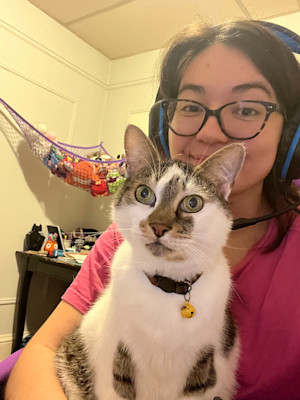
Petrana Radulovic
Petrana Radulovic is a New York City-based writer who focuses on entertainment and culture beats. In her free time, she writes fiction, sings karaoke, and tries new recipes. Her work has appeared in Polygon, IGN, Reactor, and more. She lives with a very affectionate cat named Bagel, who loves head kisses and meeting people at parties. He is smart enough to open cabinets but still too dumb to understand stairs.
Related articles
Should You Kick Your Pet Out of the Room When You Have Sex?
And what to do if you and your partner can’t agree on whether you should have an audience.
![A man on the left holds a white dog next to a woman on the right, holding an orange dog]()
What Does It Take to Co-Parent a Pet With Your Ex?
It’s definitely not for everyone. Here are five stories of pet co-parenting to keep in mind.
![An illustration of 2 dogs on a bed]()
Three’s a Crowd: When One Partner Doesn’t Want the Dog in the Bed
You want them to cuddle up, your S.O. doesn’t. Here’s how to handle the great bed debate.
![A couple laying on a bed with their golden retriever.]()
How to Stop Your Dog From Ruining Your Sex Life
Expert advice on what to do when doggy style doesn’t mean what it used to.
![a dog licking one person while another peron watches grumpily]()
Does Your Pet Like One Person in Your Relationship More?
Pet jealousy can become a thing if one partner feels like the cat or dog is just not that into them.
Should I Stop Dating Someone My Dog Doesn’t Like?
If your pup isn’t a fan, it could mean something. But maybe not everything. Here’s why.
